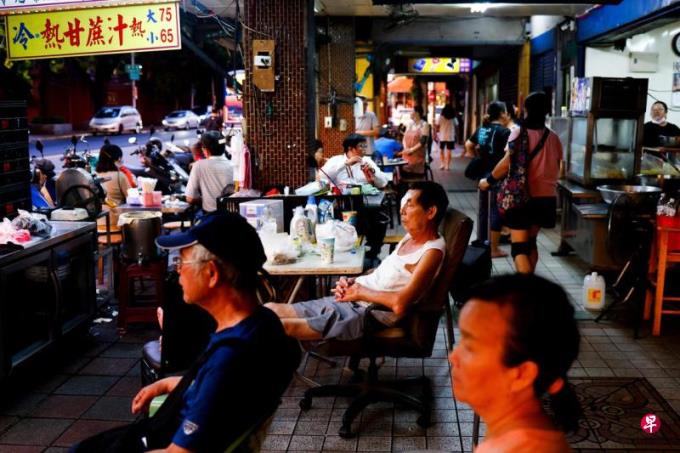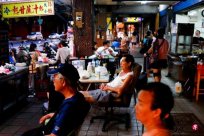
Taiwan Lai Qingde took office for 100 days on August 27. The media released politics satisfaction polls. In the hot summer days, nearly 60 % of the respondents were questioned by the guarantee of not missing electricity.Especially in recent years, many Taiwanese people may have suffered a power outage, especially the power outage accident in May and June this year, which is about 50%over the same period last year.
The 40 -year -old Nuclear Factory No. 1 machine entered the service procedure at the end of July this year; as the second machine was scheduled to be shut down in May next year, Taiwan really achieved the goal of "2025 non -nuclear home".However, the public supports the Green Energy Industry for the DPP government, but the clean energy policy has not been looking forward to it.They are even more worried about the crisis that may burst at any time before the green energy supply is ready.
Is there a shortage of electricity in Taiwan? This is a scientific issue and a political issue.Those who are in power all say that the power supply is sufficient, but the people's view is different.Faced with frequent power outages, the DPP government had to bring out the power limit policy.In order to take into account the votes, they first started from the official department. According to the author, some agencies will turn off a specific elevator, or limit the air -conditioning to 26 degrees Celsius to save electricity.
In the middle of this year, Huang Renxun, the chairman of Nvidia (Taiwan, Huida), was rejuvenating the platform, aroused a whirlwind of the development of artificial intelligence (AI) industry in Taiwan.Minister of Economic Minister Guo Zhihui evaluated accordingly that from 2025 to 2028, it will be a period of AI in Taiwan. By the end of 2025, Taiwan's electricity can support setting up five to six AI data centers.
Infertile investors caught off guard, on the one hand, the government encouraged the establishment of these data centers, but on the other hand, it tied up with the industry.Because once the data center is established, the annual electricity growth rate will be 3 percentage points.The government's "Gaoming" policy is actually to restrict the approval of such construction and development.
For example, Taoyuan recently intended to build a data center, but Taiwan Power Company refused to approve the power center on the grounds that the northern power was insufficient.The Executive Yuan pointed out that Taiwan's power supply is charged, but North Taiwan consumes great power, so it is asked to build the data center in South Taiwan.
For the operators, this move does not cut the foot to perform.The north is the bases of the Neihu Science Park, the Hsinchu Science Park and the international science and technology giants such as Meta, Google, and Yingweida. The data center is located in the south and can only increase investors.The official claims that this is the source of the north -south industry, but for the industry, it is the source of avoiding errors.
According to the Executive Yuan, Northern Taiwan lacks 20 billion yuan in electricity.However, some people estimate that this number and nuclear one (10 billion degrees) and nuclear two (15 billion degrees) have similar gaps.In other words, if Nuclear and Nuclear Second Factory has not been removed, the power supply in North Taiwan will be more than enough.Imagine further. If Nuclear IV is successfully operated, Taiwan's power supply problem is not a big issue, and it can double investors' confidence.
Based on Taipower's data last year, Taiwan's highest power department is an industrial category, accounting for about 56.6 %.Among them, TSMC, TSMC, is the largest household. This electric eating monster almost swallowed almost one -tenth of the electricity consumption in Taiwan, which is really amazing.Power consumption accounts for 100 %, and then it is the service industry that consumes 18 %.The government can also restrict industrial power consumption, or use refusal to build a case to reduce the power needs of the industrial sector.At present, the Executive Yuan stipulates that the large -scale data center of more than 5,000 kilowatts of power consumption shall not be established north of Taoyuan.
However, after all, the DPP has no political courage to demand electricity for people.Although it has risen for three consecutive years, it has not reduced the power consumption of residents at all.Therefore, in the summer, the air -conditioned residential area is still easy to encounter the risk of power outage.
The author has exchanged with relevant industry personnel in Taiwan. Taiwan currently relies heavily on the GDP (GDP) contributed by the TSMC. However, from the long -term industrial strategy view, Taiwan should also develop other high -tech industries, such as the generation of OpenAIArtificial intelligence, or the electric vehicle industry.However, in order to develop such industries, a large amount of data centers and charging stations are needed to support industrial upgrading.However, the government is unwilling to admit that there is a problem of power shortage, and it is even more difficult to expect to solve the strategy of power supply.
Green Energy, Nuclear cannot
If Lai Qingde wants to avoid political dishonesty, it is not difficult.As long as the DPP government adds a few more thermal power units, the firepower is fully opened, and the gas coal coal is burned and burned, and a large amount of electricity can be generated.But in this way, it contradicts the green energy policy they advocated.What is ridiculous is that according to the DPP planned for the power structure of 2025, 50 % of natural gas, 30 % of coal -fired, 20 % of renewable energy, and a net zero carbon row in 2050.According to this plan, the ratio of non -clean energy is still several times that of clean energy.Moreover, the government did not make it clear when this situation will reverse.
According to the former Minister of the Interior Li Hongyuan in Taiwan, the DPP wants to allow natural gas to reach half of the energy proportion. This goal has a potential crisis.Full of hidden dangers.
On the other hand, although Japan has resolutely anti -nuclear due to nuclear disasters, now the pragmatic planning energy policy has raised nuclear power generation from 9 % to 22 % in 2030, and the proportion of thermal power generation has been reduced from 65 % to 39%.It can be seen that the Japanese government understands that the method of reducing pollution energy is to improve nuclear power capacity.
The cost of clean energy also causes Taiwan's budget burden.The average sales of Taipower is 3.08 yuan per degree (NT $ 0.13, the same below), but the purchase of solar and wind power is as high as 4.84 yuan and 6.79 yuan, so the more losses, the financial losses expanded.The government's only budget to make up for losses is to pay for the whole people.
Moreover, Taipower's responsible acquisition case, Tu Li's specific manufacturer, behind the "green friends" people who have entered the party.Taking Tainan Optoelectronics Cases as an example, Gu Shenghui, president of Lizhen Group, was born in Hsinchu's "Little Yingyou" and served as deputy secretary -general.In order to avoid tedious procedures, Guan said that the head of the Tainan City Bureau pressured civil servants, and a total of 15 officials and businessmen have been prosecuted.Another example is Lai Jinlin, the father of Lai Pinyi, a former DPP legislator. Although there is no green energy background, he is the chairman of the 19 company of Yunbao Energy Group.What is more important is that the companies under his dominance will donate political money to the DPP and its candidates.He also resigned after the outbreak.
"Green Friends" monopolize the green energy industry, causing the legal industry to be blocked. The DPP government indulge the inferior coins to expel good currency, which caused the pace of energy transformation to delay.The DPP is stigmatized, and the mythical green energy is allocated to relatives.This layout of the power industry is really amazing.
The author is a graduate student in political science in Taiwan University, Malaysian current affairs commentator




